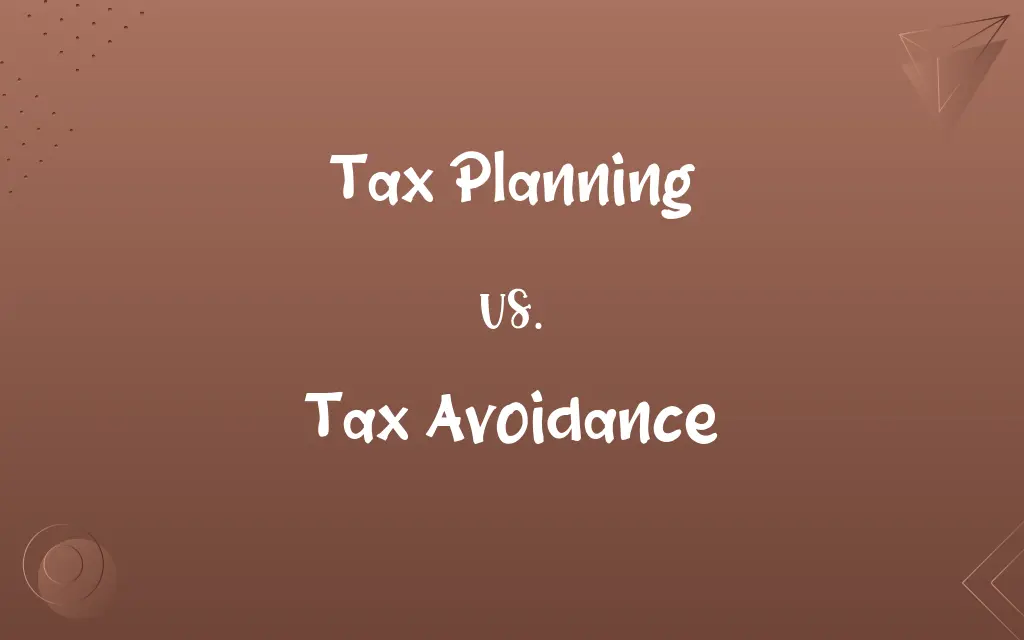Tax Planning vs. Tax Avoidance: Know the Difference

By Shumaila Saeed || Published on January 22, 2024
Tax Planning is legally optimizing tax efficiency within the law's framework, while Tax Avoidance involves exploiting loopholes to reduce tax liability, often bordering on legality.

Key Differences
Tax Planning is the legitimate use of financial planning strategies to reduce tax liability in a legal and compliant manner. Tax Avoidance, however, often involves bending the rules to minimize tax obligations, sometimes using questionable methods.
Shumaila Saeed
Jan 22, 2024
Tax Planning includes tactics like investment in tax-saving instruments, availing deductions, and using tax credits. In contrast, Tax Avoidance might involve exploiting legal loopholes or ambiguous areas of tax law.
Shumaila Saeed
Jan 22, 2024
The goal of Tax Planning is to manage finances efficiently to lower tax bills within the legal framework. Tax Avoidance, on the other hand, aims at dodging tax obligations, potentially risking legal repercussions.
Shumaila Saeed
Jan 22, 2024
Tax Planning is seen as a responsible and ethical approach to handling taxes. Conversely, Tax Avoidance is often viewed negatively, as it can involve aggressive strategies that verge on tax evasion.
Shumaila Saeed
Jan 22, 2024
Tax Planning is typically transparent and involves clear financial records. Tax Avoidance may involve complex transactions or opaque financial practices to conceal the true nature of tax liabilities.
Shumaila Saeed
Jan 22, 2024
ADVERTISEMENT
Comparison Chart
Legality
Completely legal and compliant with tax laws
Often borders on legality, exploiting loopholes
Shumaila Saeed
Jan 22, 2024
Strategies Used
Investment in tax-saving instruments, deductions
Exploitation of legal ambiguities, complex schemes
Shumaila Saeed
Jan 22, 2024
Goal
Reduce tax liability within legal limits
Minimize or dodge tax obligations
Shumaila Saeed
Jan 22, 2024
Financial Transparency
Transparent and clear financial practices
May involve opaque transactions
Shumaila Saeed
Jan 22, 2024
ADVERTISEMENT
Tax Planning and Tax Avoidance Definitions
Tax Planning
Strategically managing finances to minimize tax liability legally.
Through tax planning, she invested in retirement funds to save on taxes.
Shumaila Saeed
Jan 08, 2024
Tax Avoidance
Exploiting loopholes in tax laws to reduce taxes.
The corporation's tax avoidance scheme involved complex international transactions.
Shumaila Saeed
Jan 08, 2024
Tax Planning
Organizing financial activities to reduce tax.
The company's tax planning strategy included charitable donations.
Shumaila Saeed
Jan 08, 2024
Tax Avoidance
Minimizing tax liability through borderline legal means.
His tax avoidance involved channeling funds through offshore accounts.
Shumaila Saeed
Jan 08, 2024
Tax Planning
Utilizing legal tax benefits, credits, and deductions.
His tax planning involved claiming all eligible educational deductions.
Shumaila Saeed
Jan 08, 2024
ADVERTISEMENT
Tax Avoidance
Reducing tax through questionable financial maneuvers.
Her tax avoidance tactic included using ambiguous tax havens.
Shumaila Saeed
Jan 08, 2024
Tax Planning
Financially planning within tax laws for efficiency.
Effective tax planning helped him utilize the available tax credits.
Shumaila Saeed
Jan 08, 2024
Tax Avoidance
Dodging full tax obligations through legal gray areas.
The company's tax avoidance involved a convoluted network of subsidiaries.
Shumaila Saeed
Jan 08, 2024
Tax Planning
Legal method to lower taxes by financial planning.
Tax planning led her to adjust her investment portfolio for better tax efficiency.
Shumaila Saeed
Jan 08, 2024
Tax Avoidance
Avoiding tax payment by bending legal boundaries.
They engaged in tax avoidance by artificially inflating deductions.
Shumaila Saeed
Jan 08, 2024
Repeatedly Asked Queries
Does tax planning involve deductions?
Yes, it includes using legal deductions and tax credits.
Shumaila Saeed
Jan 22, 2024
Is tax planning legal?
Yes, it's a legal and compliant approach to reducing taxes.
Shumaila Saeed
Jan 22, 2024
Can tax avoidance lead to legal issues?
Yes, it can risk legal repercussions due to its borderline legality.
Shumaila Saeed
Jan 22, 2024
What is tax avoidance?
It involves exploiting loopholes to reduce tax liability, often in questionable ways.
Shumaila Saeed
Jan 22, 2024
What is tax planning?
It's legally optimizing tax efficiency within financial laws.
Shumaila Saeed
Jan 22, 2024
What strategies are common in tax avoidance?
Common strategies include exploiting legal ambiguities and complex schemes.
Shumaila Saeed
Jan 22, 2024
Does tax planning require financial transparency?
Yes, it involves clear and transparent financial practices.
Shumaila Saeed
Jan 22, 2024
Is maximizing deductions part of tax planning?
Yes, legally maximizing deductions is a key aspect of tax planning.
Shumaila Saeed
Jan 22, 2024
Can tax avoidance involve opaque transactions?
Yes, it may include complex and opaque financial maneuvers.
Shumaila Saeed
Jan 22, 2024
Are retirement funds part of tax planning?
Yes, investing in retirement funds is a common tax planning strategy.
Shumaila Saeed
Jan 22, 2024
Does tax avoidance use offshore accounts?
It can involve using offshore accounts to minimize taxes.
Shumaila Saeed
Jan 22, 2024
Should individuals consider tax planning?
Yes, it's advisable for individuals to engage in tax planning for financial efficiency.
Shumaila Saeed
Jan 22, 2024
Does tax avoidance affect corporate reputation?
Yes, it can negatively impact a corporation's reputation and trustworthiness.
Shumaila Saeed
Jan 22, 2024
Is tax planning considered ethical?
Yes, it's seen as a responsible and ethical approach to handling taxes.
Shumaila Saeed
Jan 22, 2024
Can tax avoidance include artificial transactions?
Yes, it can involve artificial arrangements to dodge taxes.
Shumaila Saeed
Jan 22, 2024
Can tax avoidance lead to penalties?
Yes, if deemed illegal, it can lead to penalties and legal consequences.
Shumaila Saeed
Jan 22, 2024
Is tax avoidance a sustainable financial strategy?
No, it's risky and can lead to long-term financial and legal problems.
Shumaila Saeed
Jan 22, 2024
Can businesses benefit from tax planning?
Yes, businesses can greatly benefit from strategic tax planning.
Shumaila Saeed
Jan 22, 2024
Are there risks in aggressive tax planning?
Aggressive tax planning can blur lines with tax avoidance and carry risks.
Shumaila Saeed
Jan 22, 2024
Share this page
Link for your blog / website
HTML
Link to share via messenger
About Author
Written by
Shumaila SaeedShumaila Saeed, an expert content creator with 6 years of experience, specializes in distilling complex topics into easily digestible comparisons, shining a light on the nuances that both inform and educate readers with clarity and accuracy.






































































